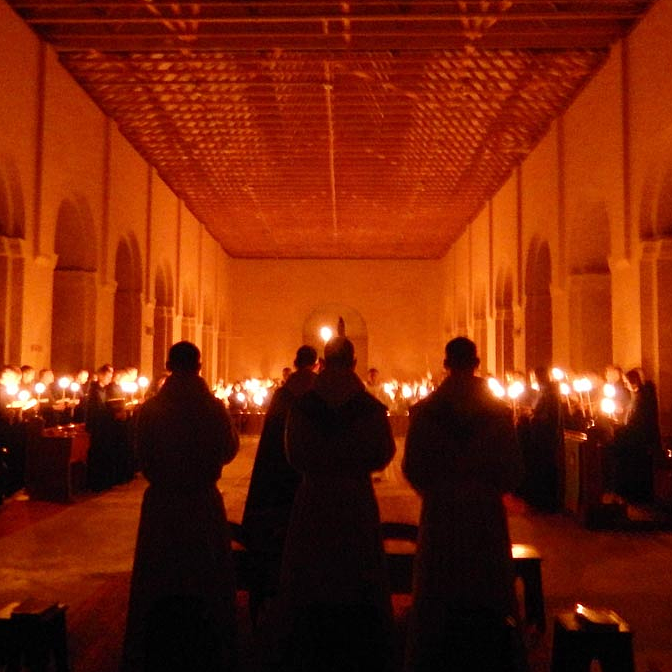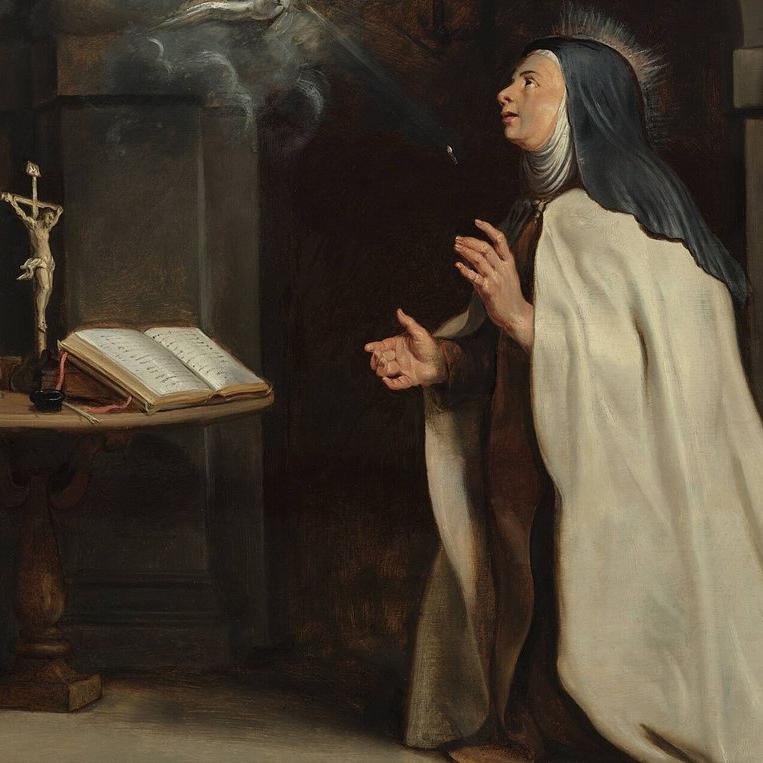Excerpts
On spiritual reading.
Excerpt from The Secret of Sanctity Do you take as much pains to nourish your soul as your body? How do you profit by the word of God? You speak to Him through prayer; but it is God Who speaks to you through good books and sermons. The word of God is never without its effect; it either converts its hearers or renders them more culpable. Are you not too curious? Are you not of those who cannot read a good book unless its style is perfect; who cannot hear a preacher unless his style is polished? Seek the books and preachers who touch your hearts and not those who flatter your ear. Never let a day pass without reading a good book. Reading, says St. Bernard, seeks God; meditation finds Him; contemplation enjoys Him. Reading helps meditation, and meditation leads to contemplation. If you like the end, adopt the means; if you desire to taste heavenly things, frequently read and meditate upon them. Seek in this tree of life the fruit rather than the flower. God, St. Paul tells us, has not willed to convert the world by eloquence, but by the fruit of His cross, which would have remained without effect if the apostles had employed the arts of oratory. It is not fine language which touches hearts, but the grace and unction of the Holy Spirit. The wisdom of God spoke to man in parables and popular language; it will never convert you by means of studied discourses, but by the strength of its spirit and the simplicity of its words.
Praying at night | The lost art of Catholic vigils.
Excerpt from Chastity: The Angelic Virtue Chapter from Thomas a Kempis’ conferences given to his novices: “Simon, sleepest thou? Could you not watch one hour with Me? Watch ye, and pray: that you enter not into temptation. (Mark. iv. 37) This voice, beloved brethren, is the voice of the heavenly King and our Saviour Jesus Christ: Who urges His soldiers to watch in the camp against the temptations of the devil. What therefore the Lord watchfully addresses to blessed Peter and the other disciples: this also undoubtedly He says to us all. Therefore, when the sacristan comes round at midnight and arouses us: let us be wakeful at once at the sound of the bell: and make ourselves ready by devout prayers to enter the choir: and hasten to meet the heavenly Bridegroom with burning torches. Let us endeavour, dearly beloved, manfully to cast off the sloth of the body: and sleepiness from our eyes. Let us lift up our hands to Heaven, to praise our Creator with joyous voices and pure minds: lest perchance the most cunning enemy prevail against us. It is a very bad habit of some, who in the dormitory or in bed lie long awake idly dreaming: and in the church and in choir slumber for lack of devotion. These often harm themselves and others: they neither serve Christ manfully: nor pray faithfully for benefactors and the afflicted. O silly brother of the race of sleepers and of the number of the foolish virgins, whose lamps, we read, went out in the night. Arise, watch, pray: sing, read, toil. Let not the mourning of the damned depart from thy eyes, the fearful clamour of the demons: the most grievous banishment from the presence of God and the joyous fellowship of the saints. I tell thee that long vigils, long lessons, the daily Hours, silence, toil, and fast make a short Purgatory: and bring great joy. It is strange that thou dost so easily feel weariness in the choir chanting or reading: and dost not grow weary with long conversing, or hearing news of the world. Understand that this is the work of the devil: who strives in every way to hinder the divine worship: and to draw thee away from the church and the gathering of them that sing psalms."Photo credit: Our Lady of Clear Creek Abbey
The anatomy of mental prayer.
Excerpt from Chastity: The Angelic Virtue Mental prayer in my opinion is nothing else than an intimate sharing between friends; it means taking time frequently to be alone with Him who we know loves us.” + St. Teresa of Avila Mental prayer in general is an interior and silent prayer, by which the soul raises itself to God without the aid of words or formulas. Mental prayer comprises three parts; the preparation, the body of the meditation, and the conclusion. 1) The preparation essentially consists in placing oneself in God’s presence. 2) The body of the meditation is the chief part of this exercise. We reflect on a subject, we turn it over in our mind again and again in order to become thoroughly impressed by it. This work of the mind is not yet prayer, it is only introductory. The other half is reserved for acts of the will which constitute the prayer proper; where certain affections arise of their own accord from the reflections we have been just making; thus, Our Saviour’s Passion excites love, gratitude, confidence, contrition, humility, etc. The examination of ourselves gives rise to regret for the past and strong resolutions for the future. 3) The conclusion consists in thanking God for the graces He has granted us during our prayer and recommend to Him our resolution. To sum up then, after having placed ourselves in the Divine presence, we reflect upon a pious subject, examine ourselves, form suitable affections and petitions, make a resolution, and, having thanked God, we retire. According to the beautiful doctrine of Monsignor Olier, mental prayer is a communion with the internal dispositions of Our Lord.
The three Hail Mary’s devotion | Two priests discuss.
Excerpt from Chastity: The Angelic Virtue “Father Casey, I’ve discovered the besetting sin of Catholics,” announced Father McMahon. “I had long suspected what it was — now I know.” “What is it — combativeness?” “Quite the contrary. Spiritual discouragement, a species of despair.” Father Casey turned and scrutinized the younger priest who sat dejectedly huddled in the big armchair gloomily eyeing the dying embers. “My dear Father McMahon,” he said, “methinks it is not so much the sheep that are discouraged, as the shepherd. Come, get it out of your system. What image has been shattered? What castle has fallen?” “I have good reason to be discouraged,” returned Father McMahon, “when I see the most promising of my young people give up the struggle, stop trying to avoid sin, and helplessly declare that it can’t be done.” “What does God give them a pastor for but to help them through precisely such a crisis?” “I have tried everything, but they say it is no use — that they are too weak and the temptations are too strong.” “Of course you recommended that sweet and consoling motive of confidence — devotion to the Blessed Virgin Mary. Our Divine Redeemer foresaw just how poor sinners would feel after repeatedly breaking all their good resolutions and weakly yielding to temptation. Hence He made His Own Mother the refuge of sinners so that the thought of this motherly advocate would prevent them from falling into despair. Surely you recommended devotion to her.” “Of course I did. But even that means has failed.” “What devotion did you point out in particular and insist on their practicing?” “Oh, I don’t know that I stressed any definite devotion. I urged them to be devout to the Blessed Mother and put their trust in her and pray to her in the time of temptation. But as to insisting on a particular devotion — no, I did not. I believe in giving them liberty of choice in such matters.” “If you were a physician,” said Father Casey, “and you were called upon to treat a case of pneumonia, I suppose you would tell the patient to take some kind of medicine, and then you would leave him freedom of choice to select the medicine that best pleased him.” “Well, I have sometimes suggested the rosary.” “Did they say it?” “The good ones did. Those who needed it most made a few desultory attempts, and then abandoned it. They complained of lack of time.” “A lame excuse indeed. Anybody that is really in earnest about saving his soul can easily find the eight or ten minutes daily required to recite the rosary. However, we physicians of the soul must, like physicians of the body, take patients as we find them. If we cannot get them to do the thing we prescribe, we must prescribe the thing we can get them to do. Did you never try the devotion of the three Hail Mary’s?” “I have mentioned it sometimes but without insisting upon it. It never appealed to me particularly — it is rather insignificant.” “My boy, St. Alphonsus Liguori had about as wide experience in dealing with souls as any man that ever lived. He did not think the devotion of the three Hail Mary’s insignificant. In fact, he says that he always recommended it to persons addicted to sins against the holy virtue, and that he never knew it to fail.” “With all due respect to St. Alphonsus Liguori and his wide experience, I will say that I have known it to fail — and fail frequently.” “I thought you said a moment ago that you never seriously recommended this devotion to those who sought counsel from you.” “True, but other priests had recommended it to them, and so I had a chance to study its effects, and see it fail.” “Are you at liberty to enumerate the details of some of these cases?” “Certainly. There was a young man I knew well; he often came to me for advice. He was good at heart, though, undoubtedly, a little weak. Well, this young man had got into evil ways but was now heartily disgusted with himself and wanted to reform. He attended a mission given by a Redemptorist Father who made him promise to practice that devotion of St. Alphonsus, the three Hail Mary’s. He must have been really in earnest, for he kept his promise faithfully. But at the end of five years he was just as bad as he had been at the beginning.” “Yes? And at the end of the next five years?” “What do you mean, Father Casey?” “I asked, what was his condition after practicing the devotion the next five years.” “Oh, he didn’t practice it another five years. He thought it was doing him no good, and so he got discouraged and quit. But even at that, I think he had given it a fair tryout.” “Do you call that a refutation of the statement of St. Alphonsus? St. Alphonsus says that whoever practices this devotion faithfully will be cured; you say you know a case where a man practiced it until he got discouraged and quit, and he was not cured. Do you call that a refutation?” “Well, how long must one keep up the devotion?” “Until God cures him. He cannot set down time limits for God. He must practice the devotion and persevere in practicing it. If he does so, God will surely cure him.” “That just reminds me of the case of a young man who practiced the devotion until he died, without being cured of his evil habit. He couldn’t do more than that. You must admit that that is valid proof.” “The young man, you say, died a bad death?” “No, I did not say that. On the contrary, he repented and died a most edifying death. But up to the time of his last illness he had made no progress whatever, despite the fact that he practiced the devotion so faithfully.” “It seems to me that a good death is the greatest grace seated can receive,” said Father Casey. “Why, certainly,” replied Father McMahon. “Then how can you say that he found the devotion a failure? It was most likely due to his fidelity in practicing this devotion that God gave him the grace to repent in his last days, despite his repeated sins. Furthermore, when you cite a practical case and, from it, try to prove that this devotion fails in its effects, you must always remember that the devotion is a devotion. It does not consist in a mere mechanical repetition of the words, just as though they formed a magic talisman which can work marvels. Before one can say that he is practicing this devotion, he must be honestly resolved to try his best to avoid sin and then he must turn to God and the Blessed Virgin and offer this prayer to them with full confidence that they will give him the strength necessary to keep his resolution.” “Father Casey, if this devotion does what you claim for it, then surely we should do all in our power to propagate it. I must confess that it is rather hazy to me. In just what does the devotion consist, and how did it originate?” “It consists,” explained Father Casey, “in reciting, morning and evening, on bended knees, three Hail Mary’s, adding after each Hail Mary, the invocation: By your holy and immaculate conception, O Mary, make my body pure and my soul holy. The three Hail Mary’s are offered to the three Persons of the Most Holy Trinity in thanksgiving for the spotless purity which they bestowed upon the Blessed Virgin Mary. The invocation is added to secure her powerful assistance in our efforts to avoid every sin. It should be the first devotion on rising each morning and the last before retiring at night. Thus every day and every night is set in a golden setting, framed in a precious frame — the three Hail Mary’s.
Learning recollection from Our Lady.
Excerpt from The Interior of Mary “The kingdom of God is within you.” Luke 17 : 21 “From the moment of the incarnation, Mary possessed within herself the author of grace. How close a union! There is none more intimate in the order of nature, than that of a mother with the child of her womb. Mary was already habituated to the practice of interior recollection, but how different the recollection in which she was now absorbed, a recollection of which she had not previously even an idea! She constantly enjoyed the presence of God, but how imperfectly in comparison with the present privilege, which authorized her to say, “God is really within me, he is more intimately present to me than I am to myself, and as my life is his, so his life is also mine.” Hitherto she prayed habitually, but now, it is Jesus Christ himself who prays in and with her, so that her prayer is one with the prayer of the Word incarnate. She has no need to transport her thoughts and affections beyond their own sphere, in order to find her God, for she possesses him in herself. Union with him has become in one sense her natural condition, the same divine Being who reposes from eternity in the bosom of the Father, dwelling in time in her chaste womb. This last remark includes all that can be said of the interior of Mary, and nothing remains but to confess it incomprehensible. As soon as Mary became Mother of God, she disappeared altogether from her own eyes. Her finite nature was engulfed in the immensity of the self-existing Being she possessed in her womb, and as a drop of water is lost in the wide expanse of the ocean, so was she absorbed in the abyss of the Divinity.” Each Christian soul can follow this example of the Blessed Mother. At the moment of Baptism, the Church teaches that the Holy Spirit descends into the soul to establish a dwelling place. The soul, filled with sanctifying grace, enjoys God’s true presence-the indwelling Trinity, an interior castle where one can remain with God. In other words, the three divine Persons are present in the soul that is in the state of grace, so that it may know Them by faith and love Them by charity. Let us follow Our Lady’s example, and make it our goal to cultivate a habitual, loving awareness of God’s indwelling presence in our soul! Take a moment to prayerfully consider the words of St. John: “If any one love me, he will keep my word, and my Father will love him, and we will come to him, and will make our abode with him.” (John 14 : 23)
The eucharistic education of young children.
When your children have reached the age of reason, it becomes your duty to explain to them, in the clearest and most precise language, the Real Presence of Jesus in the Eucharist.
The charity of Christ presses us.
Excerpt from The Love of Jesus Crucified by St. Alphonsus Liguori St. Augustine said that a single tear shed at the remembrance of the Passion of Jesus is worth more than a year of fasting on bread and water. Yes, it was for this end that our Saviour suffered so much, in order that we should think of his sufferings; because if we think on them, it is impossible not to be inflamed with divine love: The charity of Christ presses us (2 Cor. 5 : 14.). He that frequently considers the pains he has suffered for us cannot live without loving Jesus. “The charity of Christ presses us.” He will feel himself so constrained by his love that he will not find it possible to refrain from loving a God so full of love. And, in truth, from what books can we better learn the science of the saints—that is, the science of loving God—than from Jesus crucified? St. Thomas Aquinas was one day paying a visit to St. Bonaventure, and asked him from what book he had drawn all the beautiful lessons he had written. St. Bonaventure showed him the image of the Crucified, which was completely blackened by all the kisses that he had given it, and said, “This is my book whence I receive everything that I write; and it has taught me whatever little I know.” It was this sweet study of the crucifix which made St. Francis become a great seraph. On one occasion, being found crying out and weeping, he was asked what was the matter with him. The saint answered, “I weep over the sorrows and insults inflicted on my Lord; and my sorrow is increased when I think of those ungrateful men who do not love him, but live without any thought of him.” This, then, is the book—Jesus crucified—which, if we constantly read it, will teach us, on the one hand, to have a lively fear of sin, and, on the other hand, will inflame us with love for a God so full of love for us; while we read in these wounds the great malice of sin, which reduced a God to suffer so bitter a death in order to satisfy the divine justice, and the love which our Saviour has shown us in choosing to suffer so much in order to prove to us how much he loved us. Let us beseech the divine Mother Mary to obtain for us from her Son the grace that we also may enter into these furnaces of love, in which so many loving hearts are consumed, in order that, our earthly affections being there burned away, we also may burn with those blessed flames, which render souls holy on earth and blessed in heaven. Amen.











